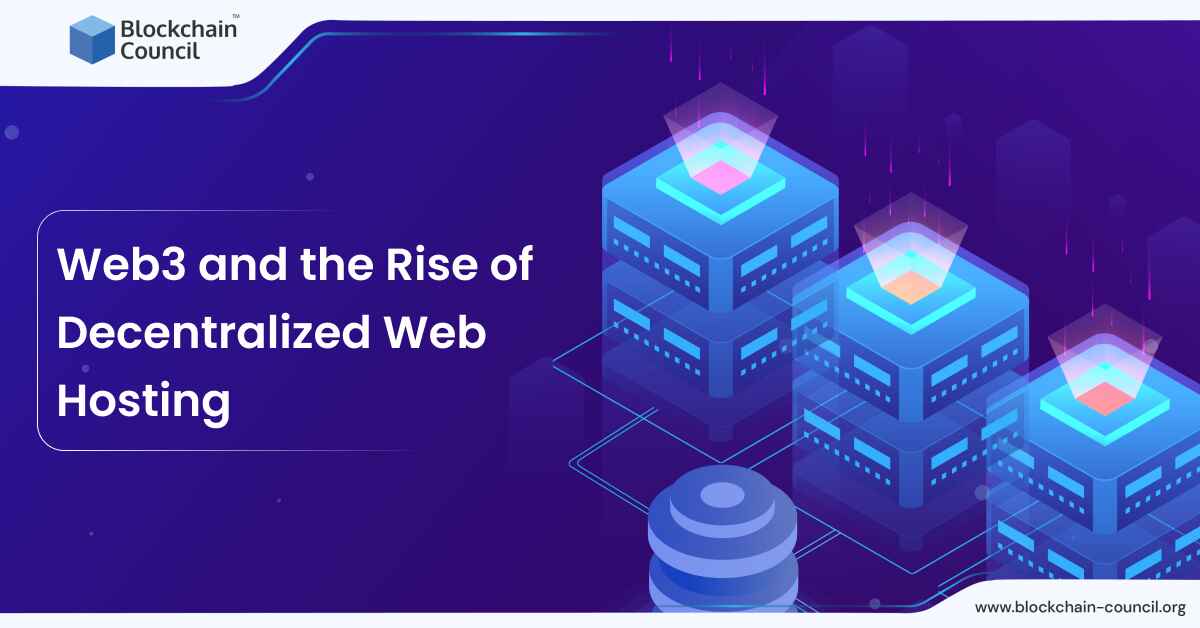
- Blockchain Council
- September 12, 2024
Web3 is the concept of the upcoming new iteration of the World Wide Web where decentralization plays the key role. Web hosting is the area that is not omitted by this trend as well, and is expected to be adopted to a large extent. While many hosting providers already offer Bitcoin VPS this is not the end of the Web3 effect on the future of web hosting. Decentralized web hosting based on blockchain is a new milestone that is already entering the scene and will only expand in the upcoming years. Let’s have a look at what this thing is going to be about.
What is Web3 decentralized web hosting?
Traditional hosting that we have known from the rise of the era of the internet relied on centralized servers. A website is launched on a server and from it it’s transmitted to all of its visitors. The servers are either owned by the website owners or are rented by them from specialized companies, since keeping your own server and maintaining appropriate network infrastructure can be rather costly, especially for a small company. This has been like this for several decades, but now with the quick development of blockchain-based solutions, this state of affairs may change dramatically.
If Blockchain allowed for the creation of different kinds of decentralized networks, then why not create a hosting that is based on such a network to benefit from all the features? This, apart from the possibility to buy VPS with Bitcoin payments, is the main idea behind Web3 hosting. How it works and what benefits can be taken from it? Let’s see.
Benefits of decentralized hosting
As with other implementations of blockchain, the benefits of decentralized hosting consist primarily of enhanced privacy, security, and control over your data. In particular:
- Security: Your data is stored on a network of interconnected nodes, not a single server. This excludes a single point of failure, which in turn makes the infrastructure much more resistant to cyber attacks like DDoS attacks and minimizes the risk of your website going down.
- Privacy: Although a reliable hosting provider is interested in cooperation and is not likely to take advantage of your data without your consent, your website is located in a single place, and if somebody accesses this server in any way, they can still your data. Such a scenario becomes impossible in the case of decentralized hosting. Not only is your data distributed over a network of nodes, of the exact locations of which even you are probably not aware, but smart contracts and encryptions make it inaccessible without proper authorization even in the worst scenario.
- Protection against censorship: Since there is no exact localization of your website, governments and other local authorities have much fewer instruments to execute their power on it, so your website, for example, cannot be shut down without your consent if it goes against someone’s interests.
- Minimal dependence on intermediaries: In decentralized hosting, there are much fewer players that can directly affect your website, with decentralized hosting platforms having much less control over your actions.
- Open web: Decentralized hosting is much closer to the idea of the open web, which was the ideal of the first internet enthusiasts. If you share their enthusiasm, then decentralized hosting is what you are looking for.
Factors to consider
Although decentralized hosting has a series of interesting features and valuable advantages, it’s a relatively new area and it’s not yet a hosting solution for everyone. Here is why:
- Novelty: Although blockchain-based solutions evolve at a swift pace, some areas haven’t been widely explored yet. There are already platforms and service providers whose infrastructure you can use for decentralized hosting, they are far not so numerous and varying as traditional web hosting providers and currency solutions might not yet be appropriate for hosting all kinds of projects.
- Technical difficulty: While the procedures of starting a website on regular web hosting were established a long time ago, with numerous guides on the internet and the technical support of the host ready to help you, decentralized hosting requires a great deal of technical expertise and its infrastructure is harder to maintain, with fewer people knowing how to do it properly.
- Scalability: In the case of conventional hosting, scaling your server up or down is a pretty mundane task – you contact your provider, ask how many resources you need, and your plan is updated. In the case of infrastructure based on a decentralized network of nodes, this appears to be much harder.
- Legal and regulatory areas: Since decentralized hosting is a very young area, the legal and regulatory aspects of it are still a subject of discussion. If the projects you deal with have to come in contact with regulatory areas, regulating different aspects of your website hosted in a decentralized way may be a daunting task.
To sum up
Decentralized hosting is a new approach to web hosting that is one of the symptoms of Web3 as a phenomenon. The decentralized infrastructure it relies on brings a great deal of benefits, solving a series of common problems of centralized web hosting and greatly contributing to the overall security and privacy of your website. However, you should keep in mind, that this approach is new and not yet widely spread and you’ll have to invest your time and effort to obtain its rewards. If all you want is just to purchase a hosting plan and upload your website to your server, then traditional hosting may end up being a better option. Otherwise, we wish you a successful exploration of Web3 and successful projects hosted on decentralized infrastructure. Take care!



































































 Guides
Guides News
News Blockchain
Blockchain Cryptocurrency
& Digital Assets
Cryptocurrency
& Digital Assets Web3
Web3 Metaverse & NFTs
Metaverse & NFTs
